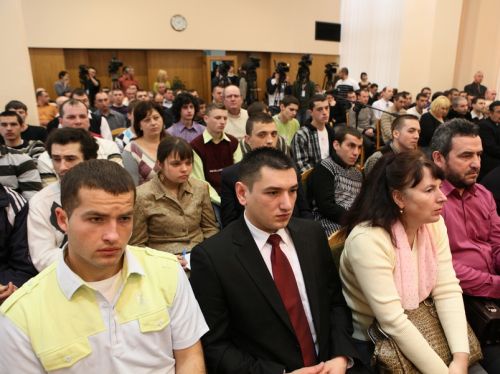
The youth are unhappy with the authorities’ indifference to the fate of the victims of events in April 2009. They say that never-ending trials don’t allow them to study or get a job. Others complain of stress and nervousness, while some are facing the bureaucratic machine because of prosecutions started two years ago. The statements were made during a public meeting at the Government, on Thursday. The heads of the law enforcing institutions attended the meeting, Info-Prim Neo reports.
“Why were youth hunted? Why didn’t the Nagacevschi commission give an answer? Why isn’t there a European commission to investigate the cases? Because there’s no will”, said Olesea Cretu, the wife of a man beaten by policemen two years ago. She complained that despite the authorities’ promises of compensations, all her requests were rejected. “Tell me, Mister Ministry of Justice and Mister Filat, why were we neglected?”, she asked.
Anatol Matasaru, who was in the Great National Assembly Square in April, 2009, says he was “morally abused” by Ruslan Saachian, head of the Criminal Police, who was later restored. According to Matasaru, Saachian is trying to use the prosecutors to obtain money from his family. Previously, Saachian sued Matasaru for calumny and the court ruled the latter had to pay damages of 140,000 lei. Finally, Matasaru complained that police workers always get away with it and left the room.
Iurie Craciuneac from Cahul was arrested alongside 59 other people in April 2009. He said that many of those persons can’t be issued passports because of the prosecutions started against them. The problem is that civil registration doesn’t recognize the documents issued by the Prosecutor’s Office that confirm the prosecutions had been terminated. Craciuneac asked the authorities to find a solution.
Participants at the meeting were unhappy that some of the policemen who abused youth were awarded and promoted. The Prime Minister said that the examining of abuse cases had to be accelerated. Filat added that it was important to take measures in order to prevent Moldovan citizens from being abused or tortured. The governmental commission investigating the events on April 7, 2009, will resume its activity within the Ministry of Justice, so that people could apply for compensations, if they failed to do so till now. The Prime Minister demanded the enhancing of activities related to the rehabilitation of April 7’s victims.
According to the Minister of the Interior, Alexei Roibu, data on 73 cases of abused youth in police stations has been gathered, 58 prosecutions have been started, of which 28 files against 44 employees have already been brought to court. 13 police workers were suspended, but 6 had to be restored, while two were acquitted, according to the court’s ruling. 22 other employees had been suspended at the Ministry’s initiative, but the court restored most of them. All those directly responsible for maintaining public order were fired.
Prosecutor General Valeriu Zubco informed that criminal proceedings were started against 112 people after the events on April 7, 2009. 68 of them have been terminated. So far, there are 18 court rulings on mass disorder crimes. Two policemen were sentenced, 8 were cleared and one received an offense penalty.

